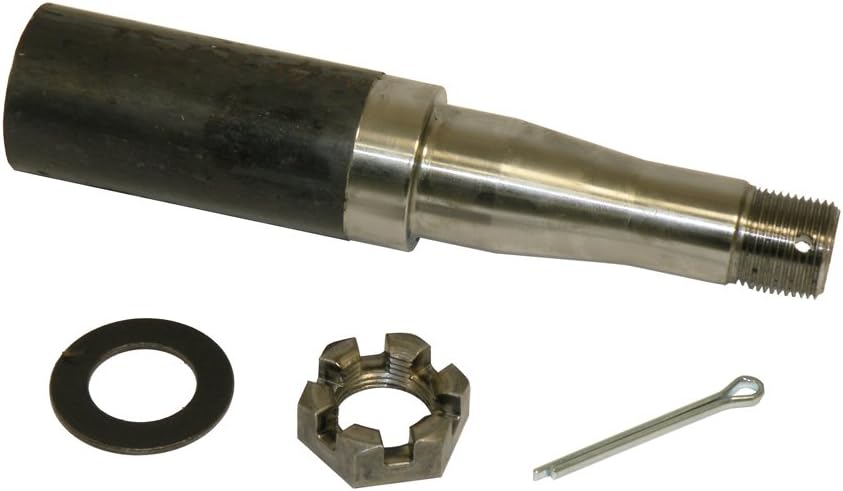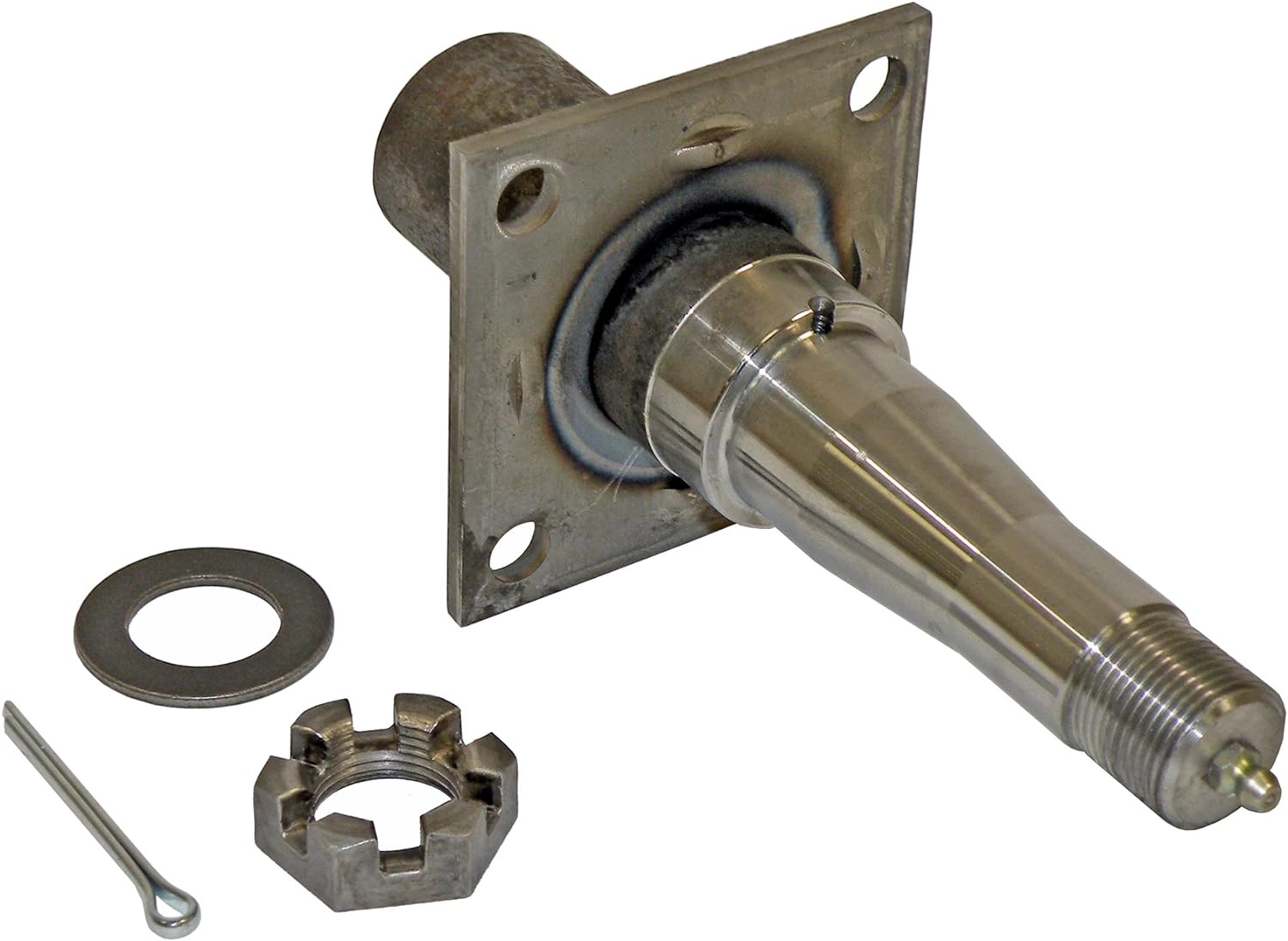Product Description
Hot Forged Trailer Spindles For Trailer Axle Parts
About Us
Most of our spindles are used in the manufacturing of or as replacement parts for various load caring uses including: Utility trailers, ATV trailers, farm trailers, motorcycle trailers, windmills, log splitters, lawn mowers , self-propelled agriculture equipment, and many more areas. Send us your sketch, plan, drawing, or dimensions and we will be happy to assist you. email or call us today for a free and a detailed quote.
About product
1.Material : Steel alloy
2.Surface Treatment : Anti-rust Oil
3.Packaging:Euro-standard Veneer Case of 1200mm*800mm*900mm
4.Process:forged , standblasting, packaging,delivery
5.Most of our products made of carbon steel, like 1035,1045,35CrMo,42CrMo,40Cr,ect
6.Also can follow your info,made by stainlee steel , and other special materials
Packing & Delivery
Our products are all packed in wooden cases to ensure zero damage. If customers have specific requirements for the packaging, we will gladly accommodate. The products will be sent to you within 30 days and we will arrange everything from the initial consultation to the delivery of your chosen port anywhere the world.
Packing Details :plywood case + Steel pallet
We can also customize the packing method according to customers’ needs.
Suitable for seaway transportation
/* January 22, 2571 19:08:37 */!function(){function s(e,r){var a,o={};try{e&&e.split(“,”).forEach(function(e,t){e&&(a=e.match(/(.*?):(.*)$/))&&1
| Processing Object: | Metal |
|---|---|
| Molding Style: | Forging |
| Molding Technics: | Forging |
| Application: | Machinery Parts |
| Material: | Steel |
| Heat Treatment: | Quenching |
| Customization: |
Available
|
|
|---|

What are the signs that indicate a need for trailer spindle replacement or maintenance, and how can they be diagnosed?
Proper maintenance and timely replacement of trailer spindles are essential for safe towing. Here’s a detailed explanation of the signs that indicate a need for spindle replacement or maintenance and how they can be diagnosed:
- 1. Excessive Play or Movement: If you notice excessive play or movement in the trailer wheels when jacked up or during towing, it may indicate worn-out or damaged spindles. To diagnose this, you can grasp the tire at the top and bottom and try to wiggle it. Excessive movement or play indicates a potential issue with the spindles that requires inspection and possible replacement.
- 2. Abnormal Noises: Unusual noises, such as grinding, squeaking, or rumbling sounds, coming from the trailer wheels while in motion can be a sign of spindle problems. These noises may indicate worn-out bearings, insufficient lubrication, or misaligned spindles. To diagnose the issue, you can listen for any unusual noises while towing or rotating the trailer wheels by hand. If abnormal sounds are present, it is recommended to inspect the spindles and bearings for damage or wear.
- 3. Irregular Tire Wear: Pay attention to the tire wear patterns on the trailer. If you notice uneven or abnormal tire wear, such as cupping, feathering, or bald spots, it could be an indication of misaligned or damaged spindles. To diagnose this, visually inspect the tires for any signs of uneven wear and check for any underlying issues with the spindles or suspension system.
- 4. Excessive Heat: Overheating of the trailer spindles can be a sign of bearing or lubrication problems. If you feel excessive heat when touching the spindle after a tow, it may indicate inadequate lubrication, worn-out bearings, or other issues. To diagnose this, carefully touch the spindles after towing and check for any unusual heat levels. If the spindles feel excessively hot, it is advisable to inspect and address the cause promptly.
- 5. Leaking or Contaminated Grease: Grease leakage or contamination around the spindle area can indicate a problem with the bearings or the spindle seal. Inspect the spindles for any signs of grease leaks or contamination. Excessive grease buildup or the presence of water or debris in the grease may indicate a need for spindle maintenance or bearing replacement.
- 6. Visual Inspection: Regular visual inspection of the spindles is crucial for identifying any visible signs of damage, corrosion, or wear. Look for cracks, fractures, or deformities in the spindle structure. Inspect the spindle surface for signs of rust or corrosion that can weaken the spindle’s integrity. Additionally, check for any loose or missing components, such as nuts or bolts, that secure the spindle to the trailer frame.
- 7. Professional Inspection: If you are uncertain about the condition of the trailer spindles or if you notice any of the aforementioned signs, it is advisable to seek a professional inspection. A qualified mechanic or trailer specialist can perform a thorough examination of the spindles, bearings, and associated components to accurately diagnose any issues and recommend appropriate maintenance or replacement.
Proactive monitoring, regular inspection, and prompt diagnosis of any signs indicating a need for trailer spindle replacement or maintenance are crucial for maintaining safe towing conditions. It is important to address spindle issues promptly to prevent further damage, ensure optimal performance, and minimize the risk of accidents or failures during towing.

How does the choice of materials impact the durability and reliability of trailer spindles?
The choice of materials for trailer spindles has a significant impact on their durability and reliability. Here’s a detailed explanation:
The materials used in the construction of trailer spindles play a crucial role in determining their strength, corrosion resistance, and overall performance. Different materials offer varying levels of durability and reliability in different operating conditions and environments.
- Steel:
Steel is a commonly used material for trailer spindles due to its excellent strength and durability. Steel spindles are known for their ability to withstand heavy loads and provide reliable performance. They are often preferred for applications that require high load capacities, such as commercial trailers or trailers used in demanding industries. Steel spindles can handle rough terrains, frequent use, and challenging towing conditions.
- Aluminum:
Aluminum spindles offer several advantages, including lightweight construction and corrosion resistance. They are commonly used in applications where weight reduction is important, such as recreational trailers or trailers that require improved fuel efficiency. Aluminum spindles provide good durability and reliability while reducing the overall weight of the trailer, which can result in improved towing performance.
- Ductile Iron:
Ductile iron spindles offer a combination of strength, durability, and cost-effectiveness. They are known for their ability to withstand heavy loads and provide reliable performance in various towing applications. Ductile iron spindles are often chosen for their high strength-to-weight ratio and resistance to wear and deformation.
- Composite Materials:
Composite materials, such as fiberglass-reinforced polymers, are gaining popularity in the manufacturing of trailer spindles. These materials offer advantages such as high strength-to-weight ratio, corrosion resistance, and reduced maintenance requirements. Composite spindles can provide excellent durability and reliability while being lighter in weight compared to traditional materials like steel or iron.
When selecting the material for trailer spindles, it’s important to consider the specific requirements of the towing application. Factors such as load capacity, operating conditions, and environmental factors should be taken into account. Additionally, it’s crucial to follow the manufacturer’s recommendations regarding material selection to ensure compatibility with other trailer components and adherence to safety standards.
In summary, the choice of materials significantly impacts the durability and reliability of trailer spindles. Steel spindles offer excellent strength and durability, while aluminum spindles provide lightweight construction and corrosion resistance. Ductile iron spindles offer a combination of strength and cost-effectiveness. Composite materials offer a lightweight alternative with high strength-to-weight ratios. By selecting the appropriate material based on the specific towing requirements, trailer owners can ensure the longevity, performance, and reliability of their trailer spindles.

Can you describe the factors to consider when selecting trailer spindles for specific applications?
When selecting trailer spindles for specific applications, several factors should be taken into consideration. Here’s a detailed explanation of the factors to consider:
- Trailer Type and Purpose:
The type of trailer and its intended purpose play a significant role in determining the appropriate spindles. Different trailers, such as utility trailers, boat trailers, RV trailers, or horse trailers, have varying weight capacities, load requirements, and operating conditions. Understanding the specific trailer type and purpose helps in selecting spindles that can handle the expected loads and provide optimal stability.
- Load Capacity:
The load capacity of the trailer is a crucial consideration when selecting spindles. It is important to determine the maximum weight the trailer will carry, including the weight of the cargo or equipment. Spindles must be chosen to accommodate the expected load capacity to ensure safe and reliable operation.
- Wheel Size and Configuration:
The size and configuration of the trailer wheels are important factors in spindle selection. The spindle should be compatible with the wheel hub assembly and match the wheel bolt pattern. Additionally, the spindle may need to accommodate specific wheel sizes or tire configurations, especially in trailers where different wheel sizes are used.
- Environmental Factors:
The operating environment of the trailer should be considered when selecting spindles. For trailers exposed to corrosive environments, such as boat trailers used in saltwater, spindles with corrosion-resistant coatings or materials should be chosen to ensure durability and longevity.
- Compatibility with Axle and Suspension:
The spindle should be compatible with the trailer’s axle and suspension system. Consideration should be given to the type of axle (leaf spring, torsion, etc.) and the suspension configuration to ensure proper fit and functionality. The spindle should work in conjunction with the axle and suspension system to provide optimal stability and performance.
- Manufacturer Recommendations:
It is important to consult the trailer manufacturer’s recommendations or specifications when selecting spindles. The manufacturer’s guidelines provide valuable information about the appropriate spindle type, size, and other factors specific to the trailer model. Following the manufacturer’s recommendations helps ensure compatibility and adherence to safety standards.
- Regulatory Requirements:
Depending on the region and specific trailer application, there may be regulatory requirements or standards that dictate the selection of spindles. It is essential to be aware of and comply with these regulations to ensure legal operation and safety compliance.
- Expert Advice:
When in doubt or faced with unique trailer requirements, seeking expert advice from trailer manufacturers, suppliers, or industry professionals is recommended. They can provide valuable insights and recommendations based on their expertise and experience.
In summary, when selecting trailer spindles for specific applications, it is important to consider factors such as the trailer type and purpose, load capacity, wheel size and configuration, environmental factors, compatibility with axle and suspension, manufacturer recommendations, regulatory requirements, and seek expert advice when needed. Taking these factors into account ensures the appropriate selection of spindles that can handle the load, provide stability, and meet the specific requirements of the trailer and its intended use.


editor by CX 2024-03-24